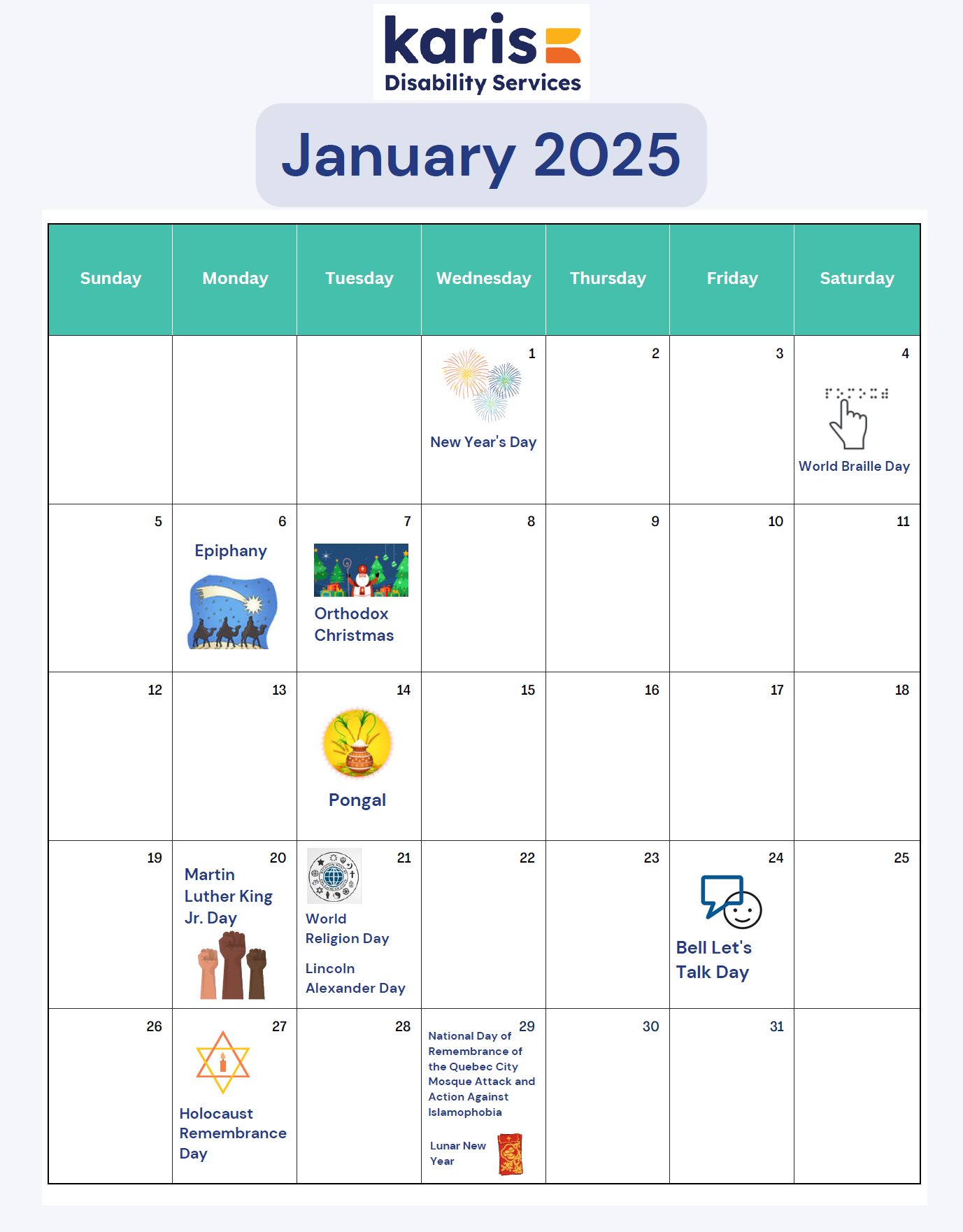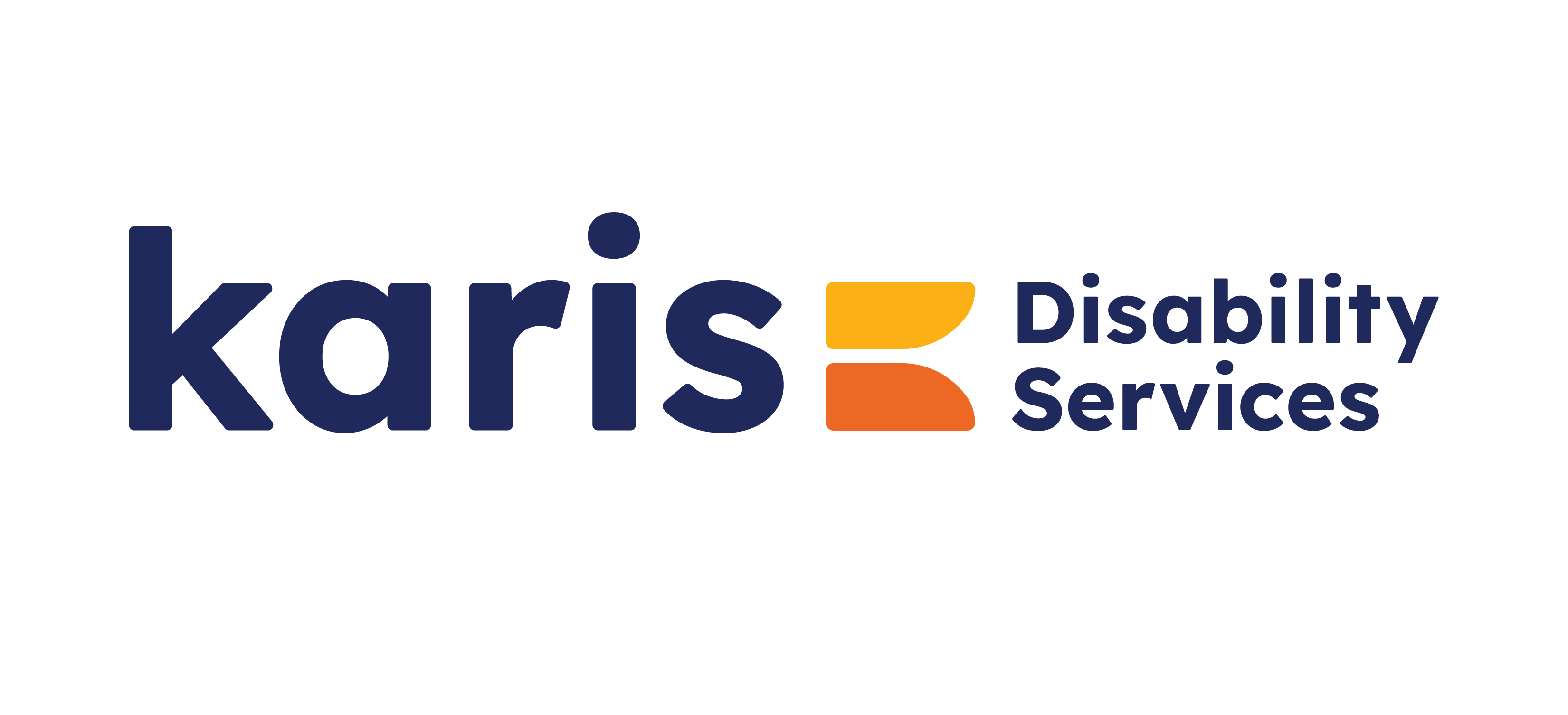We love providing a monthly calendar to track days that may have special meaning for Karis team members and people who use services, all in one space: religious and spiritual days of significance, cultural celebrations, awareness days, and health promotion days. We encourage you to take some time to explore the calendar and learn more about diversity. Staying aware of these days and scheduling activities around them will help us create an inclusive environment for everybody!
Thank you for your continued support and dedication to our shared vision. We hope this calendar inspires and enlightens you as we work towards a more inclusive world.

Download the January Diversity Calendar
In January, we celebrate and remember:
- New Year on January 1: A statutory holiday in all Canadian provinces and territories. An important symbol of New Year’s Day is the fireworks that are set off to mark the beginning of the New Year at midnight as December 31 becomes January.
- World Braille Day on January 4: Observed to raise awareness of the importance of braille as a means of communication in the full realization of the human rights for blind and partially sighted people. Celebrated on Louis Braille’s birthday, the inventor of braille.
- Epiphany on January 6: It commemorates the first two occasions on which Jesus’ divinity, according to Christian belief, was manifested: when the three kings visited infant Jesus in Bethlehem, and when John the Baptist baptized him in the River Jordan. Mummers or naluyuks may visit homes in Newfoundland and Labrador at this time of the year.
- Orthodox Christmas on January 7: This day is also known as the Feast of the Nativity and it is celebrated based on the Julian calendar. Orthodox churches are more common in Eastern Europe and the Middle East. Many of the traditional meals served on Christmas Eve and Christmas Day are reflective of those cultures. For example, in Greek Orthodox tradition, baklava, kourabiethes, melomakarona, and other pastries are baked on Christmas Eve. Christopsomo (Christ’s bread) is baked on the Day of the Feast. In Russian Orthodox tradition, the meal includes Kutya and twelve other different foods. At midnight on Christmas Eve, the festive liturgy is served in all churches. At the end of the service, a lighted candle, symbolizing the Star of Bethlehem, is brought out and placed in the middle of the church.
- Pongal on January 14-15: One of the most popular Hindu harvest festivals of South India, mainly of Tamil Nadu, and marks the auspicious beginning of Uttarayan – sun’s journey northwards. This four days long festival is celebrated to show gratitude to the Sun, Mother Nature and the various farm animals that help to contribute to a bountiful harvest.
- Martin Luther King Jr. on January 20: In honour of the life and legacy of civil rights leader Martin Luther King Jr., who pushed for social and economic improvements for African Americans while also fighting for legal equality.
- World Religion Day on January 21: A day dedicated to acknowledging, respecting and promoting unity and understanding among different faiths, traditions, and beliefs practiced around the world. It encourages individuals to learn about different religions, engage in interfaith conversations, and work towards a more harmonious and inclusive society.
- Lincoln Alexander Day on January 21: A day commemorating The Honourable Lincoln Alexander, who was a pioneer in the fight for racial equity in Canada as the first Black Member of Parliament in the House of Commons, the first Black federal Minister, and the first Black Chair of the Worker’s Compensation Board of Ontario.
- Bell Let‘s Talk Day on January 24: A campaign that has become the world’s largest conversation about mental health, encouraging Canadians and people around the world to talk and take action to help reduce stigma and promote awareness and understanding so everyone can get the help they need. Mental health issues and substance use disorders will affect one in three Canadians in their lifetime.
- Holocaust Remembrance Day on January 27: Designated by the United Nations (UN), this day marks the anniversary of the liberation of Auschwitz-Birkenau and commemorates the six million Jewish victims of the Holocaust and millions of other victims of Nazism. The UN reaffirms its unwavering commitment to counter antisemitism, racism, and other forms of intolerance that may lead to group-targeted violence.
- National Day of Remembrance of the Quebec City Mosque Attack and Action Against Islamophobia on January 29: A day commemorating the Islamophobic attack that took place at the Grand Mosque in Quebec City, which took the lives of six people and seriously injured 19 others. The Government of Canada established this commemorative day in 2021 to honour the victims and express solidarity with the survivors of this tragedy. It also represents a day of hope, a day where we can come together for a better future for Canadians of all backgrounds, for a Canada that is free from racism and hate.
- Lunar New Year on January 29: This signifies the first new moon of the lunar calendar. It’s a time rich in traditions and cultural festivities, often featuring family gatherings, special foods, and diverse cultural rituals that differ from country to country, including performances, special decorations, and the giving of good-luck gifts.
“The best thing about Karis Disability Services is the people – both those who use services and those who provide services. We honour the diverse, intersectional, and inclusive community we live in. We respect and celebrate each other’s differences and unique perspectives, abilities, cultures, religions, and identities; making us a strong and diverse community where unity and individuality go hand in hand!”
Catalina Hernandez, on behalf of Karis Disability Services Diversity and Inclusion Working Group
